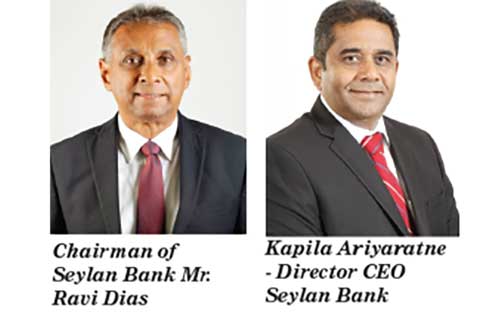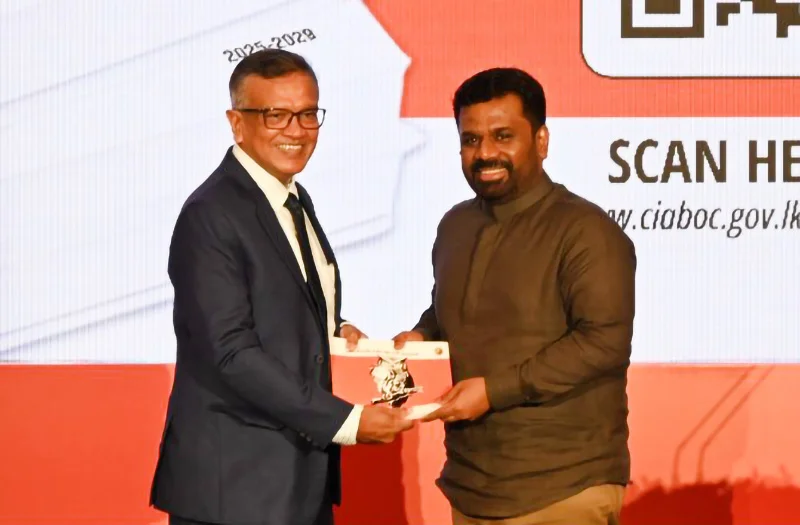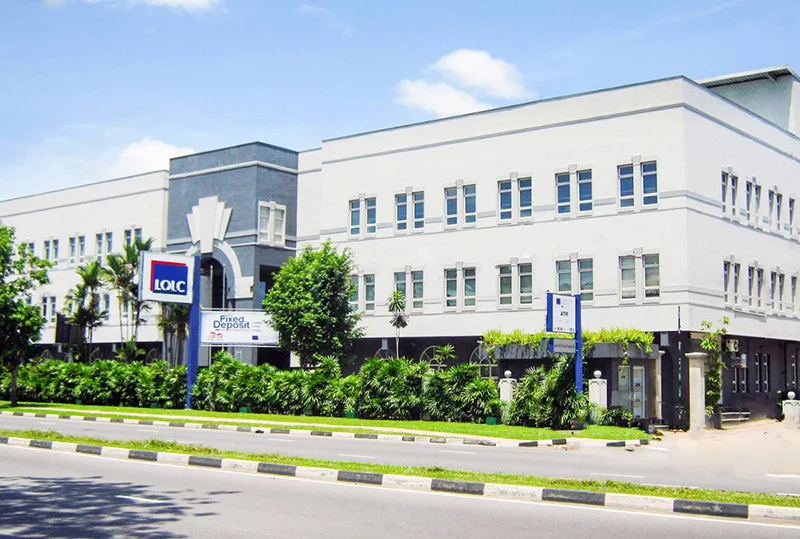Business
Seylan Bank records Rs. 1Bn PAT in 2021 Q1 despite Covid challenges

Financial Performance review for the 03 Months ended 31 March 2021
Seylan Bank made a steady start in 2021 by posting a Profit After Tax (PAT) of LKR 1Bn in Q1 2021 amidst macro-economic challenges brought in by the COVID-19 pandemic.
Statement of Financial Performances
Interest income recorded a decline due to the lower interest rates and moderate book growth but net interest margin showed a marginal increase over the corresponding period in 2020 due to lower financing costs.
Net Fee & Commission Income increased marginally to LKR 1.2Bn from LKR 1.0Bn, recording a YoY growth of 17.41% due to enhanced trade and guarantee volumes compared to the previous year.
The Total Operating Income growth of 22.25% predominantly driven by Net gains reported from de-recognition of financial assets which increased to LKR 185.2Mn from LKR 69.6Mn in 1Q 2020 and the other operating income increased by LKR 858.8Mn mainly due to increase in exchange income. On the flip side, trading activities reported a loss of LKR 611.4Mn mainly due to mark to market loss on derivatives which contracted the operating income YoY growth.
Bank recorded an impairment charge of LKR 2.2Bn during the period under review against LKR 1.1Bn reported in 1Q 2020 with a growth of 94.53% attributed to aggressive provisioning policy adopted.
Total Operating Expenses recorded LKR 3.4Bn in 1Q 2021 compared to LKR 3.3Bn in 1Q 2020. The Bank continued to focus on widening the roll-out of lean initiatives and automation across the Bank and rationalising expenditure on key controllable cost lines.
Overall, Bank recorded a Profit Before Tax (PBT) of LKR 1.4Bn against LKR 1.3Bn in 1Q 2020. Similarly, Profit After Tax (PAT) was recorded as LKR 1.0Bn against LKR 0.9Bn reported in 1Q 2020.
Statement of Financial Position
Bank achieved the LKR 562.7Bn Total Assets as of 31 March 2021, resulting 0.90% growth compared to the 31 December 2020.
Loans and advances portfolio of the Bank recorded a marginal growth of 1.51% to LKR 399.7Bn during the 1Q 2021 amidst of challenges faced. The growth in credit was driven primarily by Term Loans, and retail products such as Leasing, Pawning etc.
NPL ratio improved marginally to 6.39% against 6.43% reported as at last year end. Bank is continuously monitoring and strengthening the recovery process in order to bring under control and minimize the impact of the NPL.
The overall deposit base recorded a marginal growth of 1.28% to LKR 445.9Bn by 1Q 2021 compared to LKR 440.3Bn. Bank’s CASA ratio (Current and Savings) stood 34.52%.
Key financial ratios and indicators
Seylan Bank remained soundly capitalised, with the key capital adequacy ratios well above the regulatory minimum requirements and recorded 11.02% as the Bank’s Common Equity Tier 1 (CET 1) Capital Ratio/Total Tier 1 Capital Ratio and 13.59% as the Total Capital Ratio.
Bank maintained its liquidity position above the required minimum ratios, during the quarter under review. The Statutory Liquid Asset Ratio (SLAR) for the Domestic Banking Unit and the Foreign Banking Unit were maintained at 29.84% and 22.80% respectively as at end of first quarter 2021.
The Return on Equity (ROE) stood at 8.20% for the period under review, compared to 6.43% recorded in 2020. The Return (before tax) on Average Assets (ROAA) recorded as 1.00% in 1Q 2021.
Earnings per Share (EPS) in 2021 stood at LKR 1.88, a slight increase compared to the LKR 1.69 recorded in the comparative year, while net assets value per ordinary share recorded at LKR 91.92 (group LKR 95.23).
Successful and oversubscribed Debenture issue of LKR 6.0Bn endorsed and demonstrated the confidence placed in the Bank by the investors.
Business
National Anti-Corruption Action Plan launched with focus on economic recovery

In a decisive move to stabilize Sri Lanka’s economy and rebuild investor confidence, the Commission to Investigate Allegations of Bribery and Corruption (CIABOC) yesterday launched the National Anti-Corruption Action Plan (NACAP) 2025–2029, with a clear focus on promoting transparency, accountability and economic governance.
Developed with the support of the United Nations Development Programme (UNDP) and funded by the government of Japan—contributing nearly USD 900,000—the initiative aims to address corruption as a critical economic barrier.
The launch, attended by President Anura Kumara Dissanayake, Chief Justice Murudu Fernando PC, and high-level diplomatic and institutional representatives, signals a shift in Sri Lanka’s economic reform narrative. The NACAP is seen not just as a governance tool but as an economic recovery strategy designed to attract foreign investment, improve public finance management and rebuild public trust.
R.S.A. Dissanayake, Director General of CIABOC, noted that corruption, “is more than a legal issue—it is an economic cancer that stifles innovation, distorts markets and deters foreign direct investment.” The establishment of Internal Affairs Units (IAUs) within government institutions is expected to bring internal oversight to public spending and performance, improving the efficiency of state services.
Japanese ambassador Akio Isomata stressed that eliminating corruption is essential for Sri Lanka to regain global investor confidence. “Transparency and good governance are fundamental pillars for sustainable economic development, he said. “For Sri Lanka to attract foreign investment and achieve long-term growth, the effective implementation of this Action Plan is crucial.”
Echoing this, UNDP Resident Representative Azusa Kubota highlighted the importance of aligning governance with economic goals. “The NACAP is a roadmap for transforming Sri Lanka’s economic governance, she said. “It will make corruption visible, measurable, and actionable.”
The NACAP is built on four strategic pillars—Preventive Measures, Institutional Strengthening & Enforcement, Education, and Law & Policy Reform—targeting nine priority areas. These include streamlining state enterprise management, modernizing financial crimes investigation and integrating anti-corruption education into economic policymaking.
The implementation timeline is designed with a phased approach: short-term stabilization, medium-term reform and long-term transformation—ensuring consistent progress toward a more accountable and economically resilient state.
“Corruption ends here. The responsibility of eradicating bribery and corruption will not be passed on to the next generation — it will be resolved by our government today, President Anura Kumara Dissanayake said.
The President stressed it marks a turning point in Sri Lanka’s history. “With the launch of the National Anti-Corruption Action Plan 2025–2029, we are drawing a bold line in the sand. No longer will the fight against corruption be tangled in politics or postponed for the future. Public officials now have six months to bring transparency and integrity to their institutions. After May, the law will act decisively and without exception. This is not just policy — it’s a promise. A new era of accountability has begun and it begins with us.”
By Ifham Nizam
Business
Verdant Capital doubles down: $13.5m now powering LOLC Africa’s MSME expansion

Verdant Capital invests $4.5M more in LOLC Africa, expanding MSME lending across 10 countries and deepening financial inclusion efforts continent-wide.
Verdant Capital has announced that its Verdant Capital Hybrid Fund (the “Fund”) has completed an additional investment of USD 4.5 million in LOLC Africa Singapore Limited (“LOLC Africa”). This investment brings the total investment in LOLC Africa to USD 13.5 million. This follows the initial investment of USD 9 million in LOLC Africa, completed in June 2023. Both investments are structured as holding company loans, and they are being directed towards LOLC Africa’s operating lending subsidiaries in Zambia, Rwanda, Egypt, Kenya, Tanzania, Nigeria, Malawi, Zimbabwe, Ghana, and the Democratic Republic of Congo.
Founded in 1980 in Sri Lanka, LOLC entered the African continent in 2018. Verdant Capital Hybrid Fund is the first external investor in LOLC Africa’s operations, reflecting the Fund’s catalytic investment approach. These investments are driving the expansion of LOLC Africa’s micro, small and medium enterprises (MSMEs) financing footprint across the continent. Additionally, the Fund’s Technical Assistance Facility (TAF), has offered financial support for LOLC Africa’s Social Ratings and Client Protection Pre-Certifications for its subsidiaries in Zambia and Egypt, with further Technical Assistance initiatives in the pipeline.
Business
HNBA’s advisor & partnership channels drive 26% growth

HNB Assurance PLC (HNBA) delivered another year of outstanding financial performance, securing a 7.5% market share and moving a step closer to achieving its ambitious target of 10% market share by 2026. This success was a result of the company’s well-structured strategies, focused on sustainable growth in an increasingly competitive landscape, which yielded impressive results, with its Gross Written Premium (GWP) growing by 26% compared to the previous year.
Over the past four years, HNBA has maintained an average growth rate of 26%, consistently outperforming the industry. A key element of HNBA’s approach has been prioritizing distinctive, value-driven products over high-volume, lower-margin offerings. This strategy has allowed the company to cater to a broader customer base, ensuring inclusivity while maintaining the competitiveness and relevance of its product portfolio
In terms of growth, HNBA’s proactive investment strategy resulted in an 8% growth in investment income, reaching Rs. 6.9 Bn, while Funds Under Management saw a 26% increase. HNBA paid net benefits and claims totaling Rs. 2.9 Bn. The total assets of the company expanded by 24% to Rs. 53.4 Bn, primarily driven by increased financial investments. Additionally, total Life Insurance contract liabilities grew by 25% to Rs. 38.6 Bn, following a surplus transfer of Rs. 1.3 Bn to shareholders.
-

 Business3 days ago
Business3 days agoColombo Coffee wins coveted management awards
-

 Business5 days ago
Business5 days agoDaraz Sri Lanka ushers in the New Year with 4.4 Avurudu Wasi Pro Max – Sri Lanka’s biggest online Avurudu sale
-

 Features4 days ago
Features4 days agoStarlink in the Global South
-

 Business6 days ago
Business6 days agoStrengthening SDG integration into provincial planning and development process
-

 Business5 days ago
Business5 days agoNew SL Sovereign Bonds win foreign investor confidence
-

 Features1 day ago
Features1 day agoSri Lanka’s Foreign Policy amid Geopolitical Transformations: 1990-2024 – Part III
-

 Features4 days ago
Features4 days agoModi’s Sri Lanka Sojourn
-

 Midweek Review1 day ago
Midweek Review1 day agoInequality is killing the Middle Class











